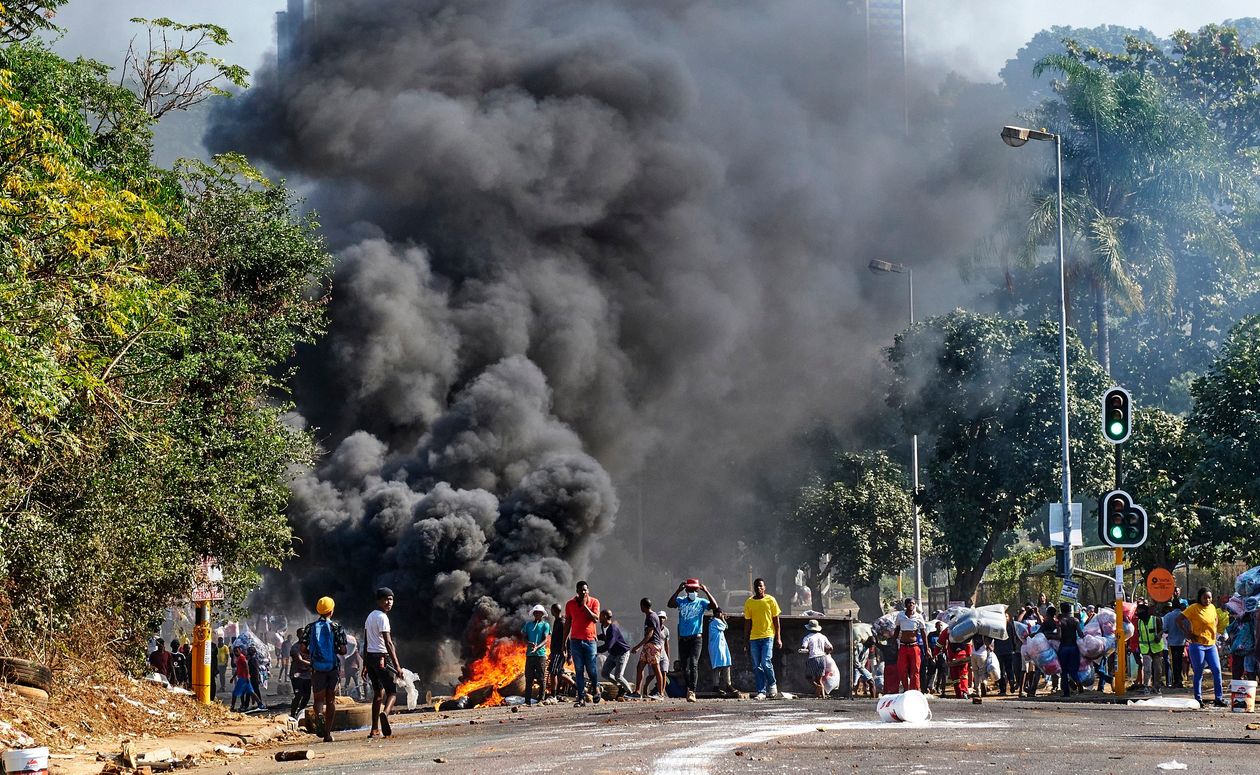RICHARDS BAY, South Africa—Last May, three men strode into a suburban street and sprayed gunfire into a car, killing mining executive Nico Swart on his way to work.
Mr. Swart, 47 years old, had been a general manager at Richards Bay Minerals, or RBM, which is majority owned by global mining giant Rio Tinto PLC. His murder, which is still under investigation, marked another grim flashpoint in the decline of South Africa’s signature industry.
In June, protesters and looters attacked RBM operations, destroying property and mining equipment. In response, Rio Tinto declared force majeure on all customer contracts at RBM, employing the legal provision that excuses parties from contract terms because of unforeseen circumstances.
South Africa’s $24 billion mining sector, which has provided the raw material for nearly half the gold bullion and gold jewelry ever produced, is waning under the pressure of violent crime, growing costs and regulatory uncertainty, as well as tapped-out mines.
Some of the world’s most familiar mining brands have headed for the door, threatening severe consequences for South Africa’s struggling economy, which has also been walloped by Covid-19. The nation’s unemployment rate hit a record 34.9% last year. Mining employs more than 450,000 people and makes up some 8.4% of national economic output.
In recent years, South Africa’s metal refineries and processing plants have been the target of commando-style robberies carried out by Kalashnikov-toting gangs. Mining companies suffered 22 armed heists at precious-metal facilities in 2019 and 2020—a period of rising gold prices—as well as an attempted robbery in 2021, according to Minerals Council South Africa, an industry group.
“I’m very angry about what’s happening in South Africa, and disappointed,” said Neal Froneman, chief executive of Johannesburg-based Sibanye-Stillwater Ltd., one of the world’s largest producers of platinum, palladium and gold. “But I have to put my personal views and emotions to one side. This is why we’re internationalizing our business.” The company in recent years has expanded mining operations to the U.S. and Finland.
The arrest in July of former President Jacob Zuma for refusing to appear at a government commission investigating alleged corruption during his nine years in office sparked the worst rioting since the Apartheid era.

A burning barricade outside a shopping center during the protests and civil unrest last July in Durban, South Africa.
Photo: Andre Swart/Associated Press
More than 300 people died in the nation’s two most populous provinces. The state insurance company estimated as much as $1.7 billion in losses from damage and looting. Ports were disrupted, and South Africa’s largest petroleum refinery was shut for more than a week, sparking panic buying.
“The looting undoubtedly had a serious impact on investor confidence,” said Mike Teke, chief executive of Seriti Resources, a Johannesburg-based coal miner, and a former executive at South Africa’s Impala Platinum Holdings Ltd. “It made South Africa look like it has no control of its law and order.”
The Fraser Institute, a Canadian public-policy think tank, ranked South Africa 60th out of the 77 jurisdictions it tracks in the investment attractiveness index of its 2020 Survey of Mining Companies. That was down from 40th out of 76 in 2019.
Mining companies in 2020 spent the least on exploration in South Africa since the end of white-minority rule in 1994, according to the South African Reserve Bank.
At an October mining conference in Johannesburg, Mineral Resources and Energy Minister Gwede Mantashe called for more foreign investment in South Africa’s mines. “We remain committed to reviving the mining sector,” he said, declaring that undiscovered deposits remained for the taking.
The Department of Mineral Resources and Energy and the office of South Africa’s President didn’t respond to requests for comment.
Angry neighbors
The attack on operations and the declaration of force majeure in June were only the latest troubles for Richards Bay Minerals—which produces titanium dioxide used in products such as sunscreen and paint.
In December 2019, RBM closed its mining operations on South Africa’s east coast for nearly a month following violence by local residents. One RBM employee was shot and seriously injured.
Rio Tinto also said it would suspend RBM’s $463 million expansion project nearby because of the attacks.

A Richards Bay Minerals mining pond in South Africa.
Photo: Richards Bay Minerals
Residents of Sokhulu, a sparse village made up of low-slung brick buildings and round huts with thatched roofs, say RBM should hire more local workers.
Lucky Nhleko, chair of the KwaSokhulu Youth, a community group, said youth unemployment in the area is around 70%. In May, RBM placed an ad for permanent positions, and residents applied, he said, but none got jobs. The following month, locals blocked roads and damaged RBM property after executives failed to show up to a meeting to discuss hiring, he said.
The two sides have since reached agreements to soothe tensions, including the hiring of 10 local workers, according to Mr. Nhleko. “We are no longer fighting,” Mr. Nhleko said.
Rio Tinto said the costs incurred from suspending operations were still being assessed. The company, which says it will stay in South Africa, restarted RBM operations in August, though the force majeure remains in effect.
Mining companies in South Africa have long relied on low-cost labor to dig some of the deepest mines in the world. Those include older operations that industry experts say are nearly impossible to mechanize. Mining fatalities climbed 20% to 60 in 2020 compared with 2019. In 2021, fatalities were up 38% through mid-December from the same period in 2020.
The jobs are largely performed by Black workers, including many who left low-performing public schools without the skills for more technical, higher-paid positions. Local unions have led monthslong strikes for higher wages.
Some companies say it is less expensive and safer to mine in other countries.

Workers by the Sibanye-Stillwater platinum mine near Rustenburg, South Africa.
Photo: michele spatari/Agence France-Presse/Getty Images
‘Full of potholes’
Some mining operations are nearly exhausted. Since 2006, South Africa has slid from the world’s No. 1 gold producer to No. 11. Production tumbled by 67% over that period and the number of employees fell by 41%.
“The new opportunities for gold investments are outside South Africa,” said Chris Griffith, chief executive of Gold Fields Ltd. The company has one mine remaining in South Africa after spinning off three older, labor-intensive assets in 2013 to form what is now Sibanye-Stillwater.
Gold Fields’ remaining South African mine, the fully mechanized South Deep, has had trouble finding workers with the experience to operate its machinery, company executives said. Mechanization, which largely removes people from labor at the face of the rock, is often unpopular locally because it requires fewer workers.
On the plus side, prices for platinum group metals, which also include rhodium and palladium, among others, shot higher during the pandemic because of related supply shortages, as well as a global move toward clean energy. South Africa is the world’s No. 1 producer of platinum, which is used in the catalytic converters that scrub out pollutants from diesel engines as well as in hydrogen fuel cells.
In addition, De Beers is investing $2 billion to expand production in its remaining South African diamond mine.
South Africa is among the world’s top 10 producers of coal, which is used to generate about 80% of the nation’s electricity. But with global pressure to curb greenhouse-gas emissions, many top international mining companies have exited the sector.
Australian miner South32 Ltd. sold its South African coal assets last year to Seriti, a 91% Black-owned mining company. Seriti also acquired three coal mines from Anglo American PLC in 2018.
The departures create opportunities for local investors but are worrisome because of the lack of outside investors, said Mr. Teke, Seriti’s chief executive.
Mr. Froneman, of Sibanye-Stillwater, said South Africa’s mining industry is suffering a slow demise. “It’s like a road that is not maintained and slowly but surely becomes full of potholes,” he said.

A miner holding a piece of platinum-rich ore from the Sibanye-Stillwater Khuseleka platinum shaft.
Photo: Waldo Swiegers/Bloomberg News
Write to Alexandra Wexler at [email protected]
Copyright ©2022 Dow Jones & Company, Inc. All Rights Reserved. 87990cbe856818d5eddac44c7b1cdeb8








